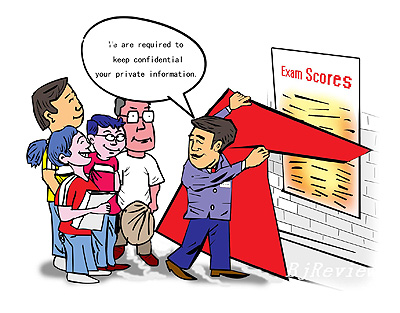|

The college entrance examination, usually called gaokao in China, is considered the most important test for middle school graduates. It's the test that makes or breaks the futures of students as the outcome determines who find their way into better universities and bright career prospects.
Every year, students' scores in this crucial examination are made known to the public through media reports and schools' own announcements. Middle schools with high pass rates in this exam are much sought after by new students, while those students who do well are thrust into the limelight.
When the results are made known they generate waves of frenetic public interest, which has become a motivating factor in a recent decision by the education authorities in east China's Shandong Province. They recently adopted new measures to reform the current education system, one of which stipulates that college exam results are private information.
Those who applaud this practice believe that by making gaokao scores private, students, parents and middle school operators can operate in a more relaxed environment and it will be easier to promote quality-oriented education among the students.
Others doubt that Shandong's new policy will help to fundamentally stop hyping up the college entrance examination, arguing that, as long as this remains such a critical moment in middle school education, media frenzy over these results will continue.
More importantly, they say, to keep gaokao scores secret will affect the fairness and transparency of the college recruiting process.
For their eyes only
Zhang Guifeng (Liaoshen Evening News): A student's college entrance exam results are a private matter. No organization should announce students' scores without their permission and the current practice should be stopped.
Nowadays, middle schools tend to use these exam results as advertising materials to attract new students. This violates students' rights, as the education institutions are making use of personal information for their own benefits.
Currently, a conundrum exists where students are told that there are other options in life apart from passing this exam, but then schools openly fete those who achieve high scores, leaving others feeling inferior.
This situation puts the education authorities in an embarrassing position.
Keeping results private therefore creates a far better atmosphere among students and allows for the promotion of improved education system.
Xu Guangmu (Three Gorges Evening News): Recent years have seen media surge on successful students in the college entrance examination, which undoubtedly encourages competition between students and middle schools. The overemphasis on gaokao, partly resulting from excessive and exaggerated reports, is largely holding back a more quality-oriented education system in China.
Shandong's efforts to protect students privacy not only shows respect for students' basic rights, but also points out a reasonable direction for reforming the current college entrance examination system. Actually, people's anxiety and dissatisfaction with gaokao do not result from the personnel selection approach, but the overemphasis of this exam. Ineffective protection of students' scores makes it easier to exaggerate. We believe that once society begins to admit that gaokao results are private, the college entrance examination will cease to carry the weight that they do.
Wang Li (www.bandao.cn): At a time when society places too much emphasis on gaokao scores, introducing an element of privacy is a good thing.
Gaokao scores are seen as a middle school's most important resource to show off its teaching quality and attract new students. Among students themselves, those who pass well feel superior, while others feel like failures. This is also the harsh reality.
| 